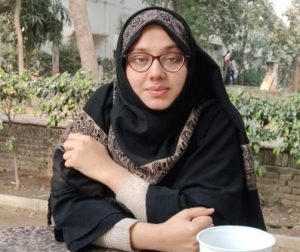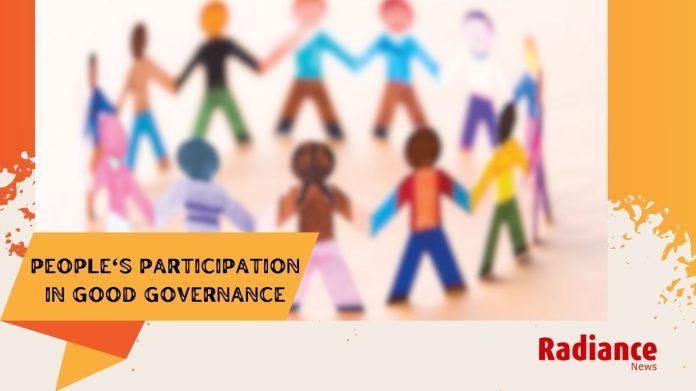“It is in your hands to create a better world for all who live in it.” – Nelson Mandela

By Syed Ahmed Ali
I n terms of Nelson Mandela, it is in the hands of the people to decide and create a better world for themselves and future generations. Good governance is only possible with the active participation of its own people. From the grassroots level to the district, district to state, and nation, in all sectors that encompass society and every aspect of government, people should question and demand the best. In the words of Abraham Lincoln, ‘Government of the people, by the people, for the people, shall not perish from the Earth.’
Most people in society may not feel a sense of ownership over the government. Some people vote while others do not. Those who vote often believe that casting their vote is their only responsibility and then become preoccupied with their daily lives. This emboldens corrupt politicians and administrations. This is why many illiterate individuals are in positions of power in government, while educated individuals may not feel empowered to question them. To address this, we engaged in dialogue with Social Activist and founder Secretary, ASEEM, Hyderabad Telangana S.Q. Masood and Tooba Hayat Khan, a student from Madhya Pradesh, to understand the importance of People’s Participation in Good Governance.

S.Q. Masood
Social Activist & founder Secretary, ASEEM, Hyderabad Telangana
After the formation of the Telangana State with the vision of ‘Bangaru Telangana,’ there has been significant development in various sectors, including IT, education, healthcare, women’s security, transportation, and administration. Overall, the state has made remarkable progress.
In pursuit of good governance, it is crucial to monitor the government’s activities and question its actions. I have been working with an organization called the Association for Socio-Economic Empowerment of the Marginalized (ASEEM), an advocacy organization in Hyderabad.
Let’s consider one example related to the development of Muslims in Telangana. The establishment of the Sudhir Committee in 2016 to study the socio-economic situation of Muslims in Telangana and the subsequent announcement of various measures and programs provided new hope for the community’s social and economic upliftment. However, little has changed in the functioning of the State Minority Welfare Department over the last 7-8 years, as revealed by the study conducted by ASEEM.
Over the past three financial years, the budget utilization rate of the Minority Welfare Department has been quite good: 56.6% in 2020-21, 80.43% in 2021-22, and 72.74% in 2022-23. A closer examination of budget utilization on a program/scheme-wise basis reveals that this is primarily due to higher spending on popular schemes such as the Shaadi Mubarak Scheme and Iftar & Christmas Feast.
Expenditure on Overseas Scholarship and RTF Schemes has been relatively high, and the budget utilization for these schemes has improved over the last 3-4 years.
These findings lead to several important recommendations:
- The budget allocated for the Minority Welfare Department should be granted the status of Sub-Plan on par with budgets allocated for SC and BC Welfare Departments.
- State-level and district-level monitoring and coordination committees should be set up with the involvement of civil society members.
- Engage with the community at the grassroots level to conduct need assessments at the time of budget formulation.
- Provide adequate infrastructure and staff for the Minority Welfare Department at the State, District, and Block Levels.
- All data and information regarding the functioning of the Minority Welfare Department should be in the public domain.
This can only happen when all the citizens feel the responsibility of questioning the government from the ground level to the state level. For this, all organizations should come together to question the government, implement all schemes, and raise concerns regarding the developments at the local and state levels. To achieve this, we need to build a strong Pressure Group consisting of senior civil society members, academicians, and religious leaders. This group should engage in regular social audits of all agencies under the Minority Welfare Department and have subsequent dialogues with religious and political leaders and government agencies.

Tooba Hayat Khan, Chhindwara Madhya Pradesh
Pursuing Television Journalism at Jamia Millia Islamia, New Delhi
Being a politically significant state, particularly under the current government’s rule, Madhya Pradesh has attracted the nation’s close attention. Political parties are engaging in various tactics to secure the vote bank. However, the stances, choices, and participation of the people in governance are raising serious concerns. Madhya Pradesh was historically a stable state in terms of communal harmony, but it has been affected in recent years, and the lack of people’s engagement in addressing this issue is worrisome. Factors such as communal stability, women’s security, judicial fairness, state-level government scams, pending results of numerous service examinations, transparency, and others are not high on the list of concerns for the majority of voters ‘this time.’
The present BJP government in the state, led by Mr. Shivraj Singh Chouhan, is primarily focused on directly providing financial schemes to the people. Some striking schemes were initiated this year to ensure a favorable vote count in this crucial election for the Shivraj government. On the other hand, to secure the support of the caste-based vote bank, the party is specific, allocating tickets to candidates connected to particular castes.
Mr. Shivraj has served as Chief Minister for 17 years and is a well-known figure among the people. Party advertisements feature two prominent figures, i.e., PM Modi and CM Shivraj, which has created an ironic situation at the local level. Common people in the state are less familiar with or completely unaware of the local representatives who have received tickets from the party. This raises the question of the basis on which voters will choose the party’s representative in their area: will performance, accountability, responsible behavior, and democratic ethics matter in the 2024 elections?
In short, Madhya Pradesh is currently lagging in terms of people’s engagement in good governance, and the opposition is also following a similar approach as the present government.




